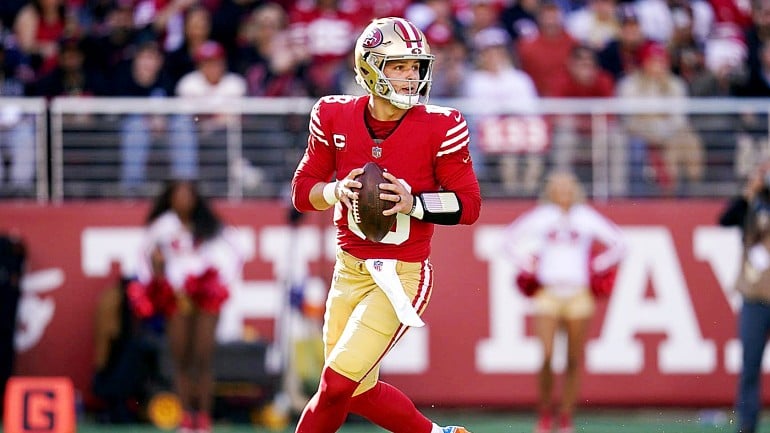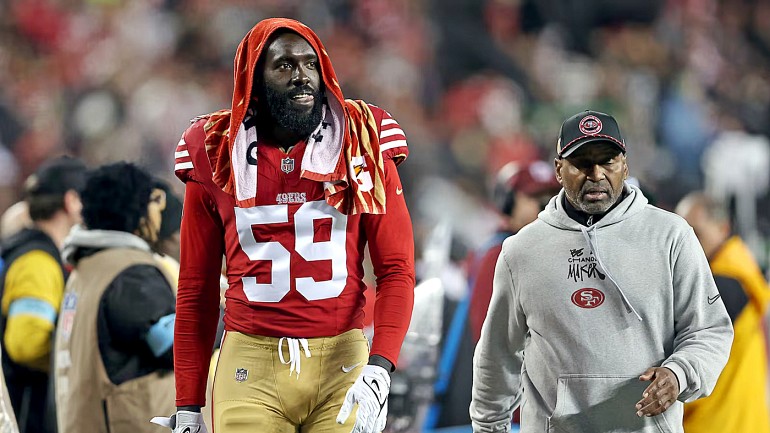The San Francisco 49ers' -11 turnover differential has been a thorn in the Niners' side during the team's one-win 2018 season. Surprisingly, this ugly statistic bodes well for the 49ers' future.
The San Francisco 49ers are on pace to break an NFL record in 2018, but it's not the kind of record a team wants to break.
Over the first six games of the 2018 NFL season, the 49ers' three takeaways -- one interception and two fumble recoveries -- is the lowest total in the NFL. By contrast, San Francisco turned the ball over a league-high 14 times in its first six games. Thus, the 49ers' turnover differential of -11 is the worst turnover margin in the NFL.
The NFL record for the worst single-season turnover differential in the post-merger era currently sits at -28. With a -11 turnover margin over their first six games, the 49ers are on pace to eclipse that mark in 2018:
Turnovers have plagued the #49ers in 2018. They rank dead last in both giveaways and takeaways. Their -11 turnover margin puts the @49ers on pace for -29.3 this season, which would set a new #NFL record for the worst turnover differential in the post-merger era. #49wz #GoNiners
— Chris Wilson (@cgawilson) October 16, 2018
Victory and Turnover Differential
Of all the advanced stats collected in today's NFL, the correlation between victory and a very simple statistic -- turnover differential -- remains one of the strongest. Hank Koebler, who now writes for the Huffington Post, found that they have a strong positive correlation of 0.65. In his study, Koebler determined that NFL winning percentage is highly dependent on turnover differential.
The reason behind this is simple. Turning the ball over has a significant impact on Expected Points and Win Probability; a turnover decreases one team's chance of scoring, while increasing its opponent's chance of scoring, and the larger the turnover differential, the greater impact it has on Expected Points and the probability of victory.
Of course, the correlation between turnover margin and winning percentage isn't pure causation, since teams playing from behind are more likely to take risks, which are more likely to lead to turnovers. But there's little question there is strong causation between turnover differential and victory.
A recent example is the 49ers' Week 1 matchup with the Minnesota Vikings. Running back Alfred Morris' goal-line fumble and quarterback Jimmy Garoppolo's pick-6 played pivotal roles in San Francisco's one-score loss, but Garoppolo's late interception, while still important, had less of an effect on the game's final score.
Winning by Winning the Turnover Battle
How important is turnover differential? Teams who win the turnover battle also win the game 78 percent of the time, which has been consistent over the life of the NFL -- and the greater the turnover margin, the greater the team's chance for victory.
Win the turnover battle by two, and you'll win 84 percent of the time; if you can force a three-turnover advantage, you'll have a 90 percent chance of victory.
Is it any surprise that the 49ers, who average nearly two more giveaways than takeaways per game, are 1-5 to start the season? And is it a coincidence that the one game when San Francisco won the turnover battle came in its lone victory of the year?
Over the course of a season, teams that are outliers in turnover differential -- like the 49ers have been so far in 2018 -- are also outliers in the NFL's final standings. FanSided's Lyle Graversen determined that the top 10 teams in turnover differential average 10.4 wins per season, while the bottom 10 teams average 5.7 wins a year.
Using a recent five-year sample, Graversen found that NFL teams finished a season with at least a +10 turnover margin 33 times. Those teams averaged 11 wins that year, and only one team finished the season with a losing record.
Over the course of a season, how important is overall turnover differential? The Harvard Sports Analysis Collective determined that 42 percent of a team's win total is attributed to winning the turnover battle. Other studies have found the number to be as high at 44 percent.
A plethora of injuries and a difficult schedule -- among other factors -- have certainly contributed to the 49ers' poor start to the 2018 season, but turnovers have played an extremely significant role in San Francisco's 1-5 record.
So, how can the 49ers' horrible turnover problem be a good thing for the team's future?
Turnovers are Random
The most important factor in both creating and allowing turnovers is luck. The same Harvard Sports Analysis Collective study, and other studies based on the work of sabermetrics guru Tom Tango, attribute over half of seasonal turnover differential to luck.
NFL teams have some control over interceptions thrown -- which makes sense, as some quarterbacks are better than others at protecting the ball -- although the correlation between seasons isn't strong. Meanwhile, teams have little to no control over total fumbles lost or recovered over the course of a season; in fact, there's little correlation between fumble totals during the two halves of a given season.
Because turnovers are so random, a team's turnover differential is extremely inconsistent from one season to the next. ESPN's Bill Barnwell has shown that this is especially true for teams at the extreme ends of the turnover spectrum. For a recent example, we need to look no further than 2018.
The Cleveland Browns currently lead the league with a +7 turnover margin, just a year after their -28 mark tied the NFL record for the worst turnover differential in a season.
The San Francisco 49ers' Future
All of this is good news for the future of the 49ers' franchise. While the Niners have their fair share of problems to address -- from personnel issues to play calling to clock management -- San Francisco's record is consistent with the team's historically poor turnover differential, and roughly half of their turnover margin isn't their fault. If their turnover differential was reversed, what would the 49ers' record be in 2018? With a weekly turnover margin of nearly +2, on average, an NFL team would be 5-1 after six games, not 1-5.
Since nearly half of games are determined by turnovers and over half of those turnovers are based on luck, an NFL team still has a considerable amount of control over its destiny. However, if a team with a historically poor turnover differential expects to win, it has to be nearly perfect in all other aspects of the game. Are the 49ers this otherwise perfect team? Absolutely not -- but no one expected them to be, as they're only in the second year of their rebuild.
How good -- or bad -- are the 2018 San Francisco 49ers? It's difficult to tell, but it's clear they're not the cellar-dwelling team that their one-win record suggests. The Niners are on pace to break turnover records by the end of the season, but the randomness and luck associated with turnovers allows us to say with relative certainty that they won't.
The 49ers need to continue to work on the aspects of the game that are under their control -- and then they need to wait for the ball to begin to bounce their way. History tells us that it eventually will, but until their turnover margin regresses to the mean, we won't know how far this team truly is from becoming a future playoff contender.
Be patient. The San Francisco 49ers' playing field will eventually level off. And when it does, you may be surprised by what you'll see.
Chris Wilson covers the 49ers, the NFL and fantasy football for a variety of websites and publications, with a focus on statistical analysis, film breakdowns and NFL game theory. For inquires, you can reach Chris Wilson on Twitter @cgawilson.
- Chris Wilson
-
Written by:You may have seen Chris Wilson's work on NFL game theory, statistical analysis, and film breakdowns at Minute Media, FanSided, Niner Noise, Insidethe49, LockedonSports, ClutchPoints, and others. Follow Chris on Twitter @cgawilson.




